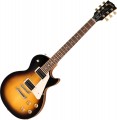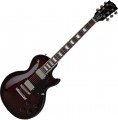Add to comparison |  |  |
|---|---|---|
| Gibson Les Paul Studio Tribute 2019 | Gibson Les Paul Studio 2019 | |
from $1,599.00 | Compare prices 1 | |
| TOP sellers | ||
Maple top. Mahogany body. Nitrocellulose satin finish. Case. | ||
| Type | electric guitar | electric guitar |
| Number of strings | 6 | 6 |
| Pickups | passive | passive |
| Pickup diagram | H-H | H-H |
| Coil cutoff | ||
Tone block | ||
| Type | passive | passive |
| Volume controls | 2 | 2 |
| Tone controls | 2 | 2 |
| Pickup switch | 3 position | 3 position |
Body | ||
| Type | monolith | monolith |
| Size | 4/4 | 4/4 |
| Shape | Les Paul | Les Paul |
| Cutaway | single | single |
| Pickguard | ||
| Material | mahogany | mahogany |
| Body top | maple | maple |
| Bridge | Tune-o-Matic (fixed) | Tune-o-Matic (fixed) |
Neck | ||
| Mount type | pasted | pasted |
| Number of frets | 22 | 22 |
| Nut width | 43 mm | 43 mm |
| Fretboard radius | 12 " | 12 " |
| Anchor | single | single |
| Scale | 24.75 " | 24.75 " |
| Pegs | closed | closed |
| Neck material | maple | mahogany |
| Fretboard | rosewood | rosewood |
In box | ||
| Case | ||
| Color | ||
| Added to E-Catalog | march 2019 | march 2019 |